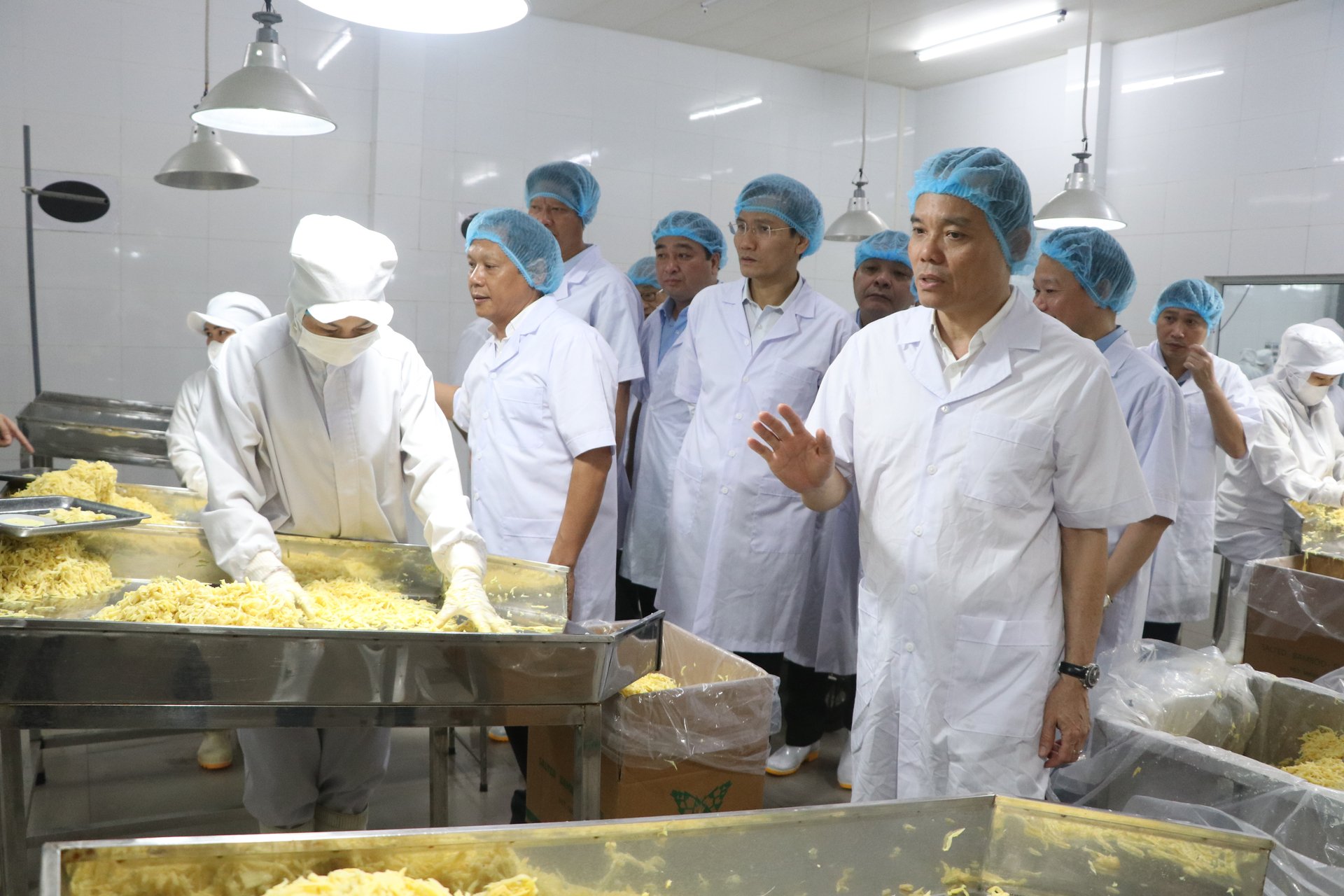November 28, 2025 | 00:20 GMT +7
November 28, 2025 | 00:20 GMT +7
Hotline: 0913.378.918
November 28, 2025 | 00:20 GMT +7
Hotline: 0913.378.918
The working group was accompanied by the Minister-Chairman of the Committee for Ethnic Minorities Affairs, Hau A. Lenh, and other representatives of various Central ministries and agencies.
During the visit to Tran Yen district (Yen Bai province), Deputy Prime Minister Tran Luu Quang and the delegation toured Yamazaki Vietnam Company, one of two facilities in Tran Yen district engaged in the export-oriented processing of Bat Do bamboo sprouts. The company, which was constructed and put into operation in the Hung Khanh industrial cluster in 2021, is a Japanese-Vietnamese joint venture whose primary industry is the export processing of Bat Do bamboo sprout products.

Deputy Prime Minister Tran Luu Quang visited the bamboo sprouts purchasing and processing area of Yamazaky Company. Photo: Thanh Hung.
After two years of operation, the company has partnered with cooperatives and cooperation groups to provide training on care, harvest, and advanced material and fertilizers to farmers engaged in intensive material cultivation. The company annually purchases 4,000 tons of bamboo spouts, processes and exports over 700 tons of the products to Japan, and employs over 60 laborers on-site.
Japanese investors examined locales in March 2023 in order to continue the expansion of production, increase the volume of purchases, and process exports. Consequently, the company anticipates Yen Bai province and Tran Yen district to continue implementing the value chain of Bat Do bamboo sprout, mobilizing people to exploit suitable land areas to transform plants to expand area, renovating the old bamboo area, and investing in intensive cultivation to increase yield and output.
In Khuon Bo village, Hong Ca commune, Deputy Prime Minister Tran Luu Quang and the delegation also visited some material areas and models of Bat Do bamboo seedling cultivation. This is the first Mong village in the province to meet the criteria for a model new rural area, and it has been deemed a "model" for the development of new rural areas nationwide.

The Deputy Prime Minister noted that Yen Bai province should pay attention to creating the most favorable conditions for domestic and foreign enterprises to maintain and expand the Bat Do bamboo sprout material area. Photo: Thanh Hung.
Currently, the district of Tran Yen has formed a concentrated material bamboo sprout area on an area of 4,200 ha; the harvest area for commerce has reached over 3,360 ha; and the annual output of bamboo sprouts has surpassed 30,000 tons. Bat Do's bamboo sprout cultivation in 2023 is anticipated to yield 32,500 tons of commercial bamboo sprouts worth approximately 200 billion VND.
Deputy Prime Minister Tran Luu Quang recognized the efforts of Yen Bai province, Tran Yen district in attracting and luring investments for projects with foreign direct capital investment in constructing processing facilities in the material area and implementing the linking chain effectively in some mountainous areas such as Yen Bai.
The Vice Prime Minister stated that Yen Bai province and Tran Yen district must facilitate local and foreign enterprises in maintaining and expanding the Bat Do bamboo sprout material area, expanding production scale in accordance with the value chain, contributing to the underwriting of bamboo sprout products, increasing income, and enhancing the quality of life for the local population.
The Scheme on restructuring the agriculture sector attached to new rural construction in Yen Bai province from 2021 to 2025 identifies Bat Do bamboo as one of the main force plants, aiming for the production area to reach 5,000 ha by 2025, with the production area according to standards and verifications reaching approximately 1,000 ha.
According to the Ministry of Agriculture and Rural Development, the total area of bamboo cultivation across Vietnam reaches nearly 1.6 million ha, mostly distributed in cities and provinces. There are 37 provinces owning a planting area of over 10,000 ha. Every year Vietnam logs 500 - 600 million bamboos, resulting in a total output of approximately 2.5 - 3 million tons. Bamboo export value is USD 300-400 million/year and 25% of the output is exported to the USA. Korea and Japan are also Vietnam’s large bamboo importers with a proportion of approximately 15% each. With the trend of green consumption and sustainable consumption, bamboo products are increasingly popular in the markets.
It can be said that bamboo is the regenerative material of the future as it has the fastest growth and maturity speed of all trees, only 3 to 5 years. Another thing is that bamboo can regenerate itself without having to replant after harvesting, and it does not require much care or pesticides to grow.
Translated by Linh Linh
/2025/11/27/3830-1-152901_403.jpg)
(VAN) Dong Nai is developing its key crop areas, expanding planting area codes, and applying high technology to increase the value of agricultural products, aiming at a green and sustainable agriculture.

(VAN) Tay Ninh’s livestock sector is undergoing a major transformation, applying high-tech, closed-loop circular models to build sustainable value chains.
/2025/11/26/3627-4-082628_818.jpg)
(VAN) From a small café on the red basalt highlands, Le Van Hoang started a business with clean coffee, building Enjoi Coffee into a symbol of organic agriculture in the Lam Dong plateau.
/2025/11/25/0045-1-135246_13.jpg)
(VAN) Ca Mau is researching a model of sea-encroaching embankments combined with viaducts and logistics service zones, aiming both to prevent erosion and create land funds for marine economic development.

(VAN) The information was shared at the seminar 'Urban Agriculture - Solutions for Developing Green Spaces,' organized by the Kinh te & Do thi Newspaper and the Biotechnology Center of Ho Chi Minh City.
/2025/11/19/4141-2-132831_216.jpg)
(VAN) One of Japfa's outstanding solutions is implementing digital transformation and artificial intelligence (AI) to optimize operations, enhance productivity, and advance sustainable development.
/2025/11/19/4847-1-093540_448.jpg)
(VAN) The Gia Lai Provincial People’s Committee had a working session with the delegation of the U.S. Department of Agriculture, the State of Idaho, and representatives of the State's leading enterprises.